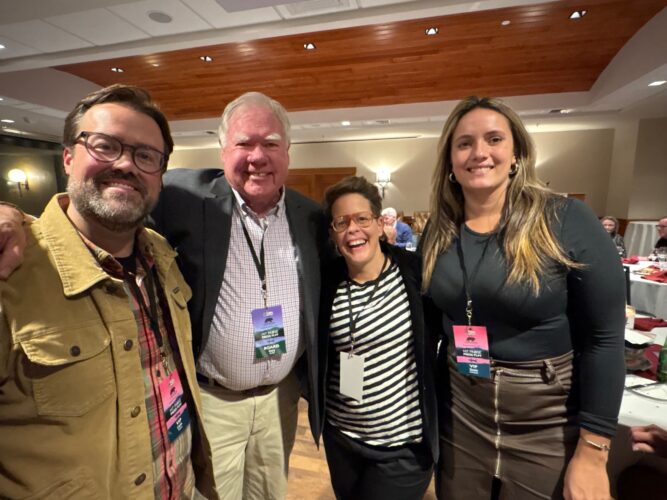ADIRONDACK FILM: Stockade Works, Adirondack Film want you to work in the film trade

Gary Smith welcomes people to the trailer party at the High Peaks Resort during the 2022 Lake Placid Film Festival. (News photo — Andy Flynn)
There’s a saying in showbiz that goes like this. If someone tells you they landed a union job in film or TV, the only reasonable response is, “Who’s your uncle?”
The entertainment industry is notoriously difficult to crack open, with nepotism being the most common way a person makes it in, but Stockade Works and Adirondack Film want to change that. They want to be your uncle.
Stockade Works was founded in 2016 by the multi-hyphenate artist Mary Stewart Masterson. She had just moved her family to the Hudson Valley and wanted to help build an ecosystem that would benefit and sustain the locals. The core of Stockade Works is dedicated to furthering the potential for film in the area. Their slogan Make Local Work is a double-entendre that implies let’s make work here as well as let’s get locals working.
I think we can get behind that, and it only gets better.
Stockade Works has a signature, four-day training program called Crew Boot Camp. Day 1: You receive an introduction to how to be on set, a program that includes learning how to read a call sheet, what to wear, and the dos and don’ts of being a production assistant. Day 2: You rotate through the various departments to ultimately choose a department by the end of the day. Day 3: You work in your chosen department, preparing for the shoot. Day 4: You participate in a shoot. The experience is as real as they come, with an 8 am call time and a call sheet distributed the day before. By the end of the training, you are ready to work on set.
You might be wondering, how much does this all cost? Ninety-five percent of trainees don’t pay anything. This is your uncle opening the door to the film and TV industry.
–
Access and inclusion at Stockade Works
–
Moreover, as part of their social equity mission, Stockade Works looks to the fringes and finds valuable talent. As Executive Director Susie Sofranko explained, “Of the over 450 adults trained in our program, 39% of them are from the BIPOC community, and 65 percent are women or non-binary. While some of our Hudson Valley urban centers are more diverse, overall, this statistic is significant for our area. Achieving this level of diversity has been possible through intentional outreach and recruitment.”
“We’ve also partnered with veterans,” she continued. “Vets have many transferable skills and understand the chain of command that is inherent to film and TV.”
Part of the Stockade Works approach is to encourage people to think of their preexisting skills as transferable to a film and TV context. Have you worked in a hair salon cutting hair? Are you often asked to do make-up for all your friends? Are you good with numbers? You could do hair, make-up, or accounting on set.
We often think of film in terms of actors and directors, but the reality is that the film world truly is an entire world.
Every mode of life is needed to make a film, and when a film is shot on location, a film world is needed to sustain it. But that’s expensive. It costs a lot of money to move a film crew from place to place to shoot a film. The most common way to shoot a film on location is to hire local help. What happens when there aren’t sufficient film-tradespeople to populate the film world? The production goes elsewhere.
–
Make local work
–
According to Gary Smith, the chair of Adirondack Film, the Adirondacks are attractive to film productions, but the area loses out to other locations because of insufficient personnel.
“We’ve lost productions before, and it will happen again if we don’t educate our locals in the film trade,” he said.
And why wouldn’t we educate our locals in the film trade? The double-entendre of Make Local Work applies as much to the Adirondacks as it does to the Hudson Valley. That’s why Smith looked to Stockade Works as a model for meaningful inspiration.
As Smith explained, “We were introduced to the leadership of Stockade Works through the New York Production Association (NYPA) about three years ago. They came with a wonderful reputation within the industry, and they quickly proved that we could trust their experience, their coaching, and their inspired leadership.”
Smith is working hard and fast to make local work a reality.
“We are working to develop the Futures in Film pilot program with the Lake Placid Central School District. We hope that by introducing the wide range of film jobs available to young people, we will spark an interest in the film trade, and we hope that we will be able to bring the pilot program to other schools located within the area represented by the Adirondack Film Commission,” he said.
If there is a part of you that finds this interesting, Stockade Works and Adirondack Film encourage you to explore that interest. Take a chance. You may end up working on a film set near you.
For more information, check out Adirondack Film at www.adirondackfilm.org. The festival, held from Oct. 30 to Nov. 2, has a diverse program that includes film and seminars on the film trade.


